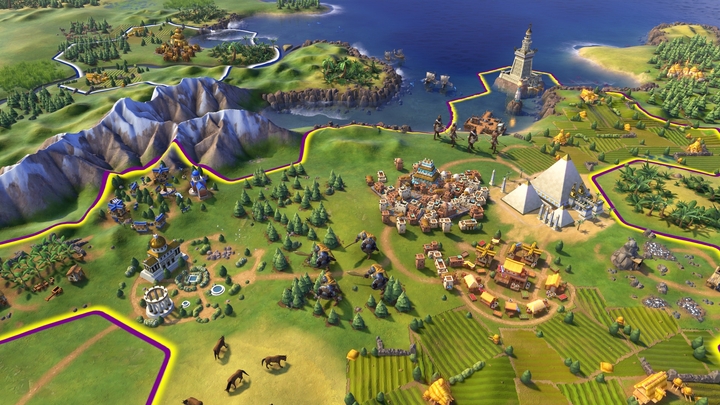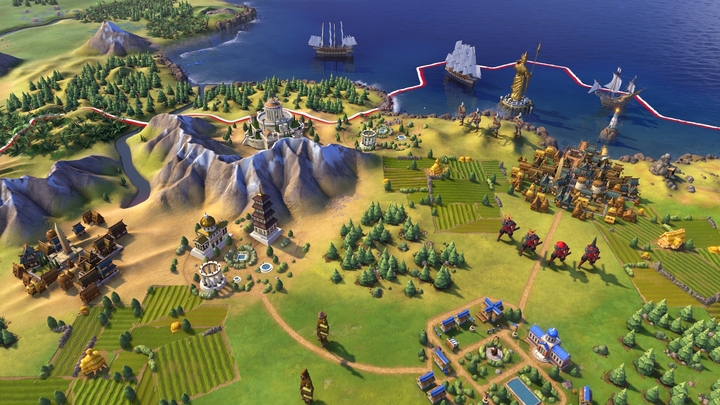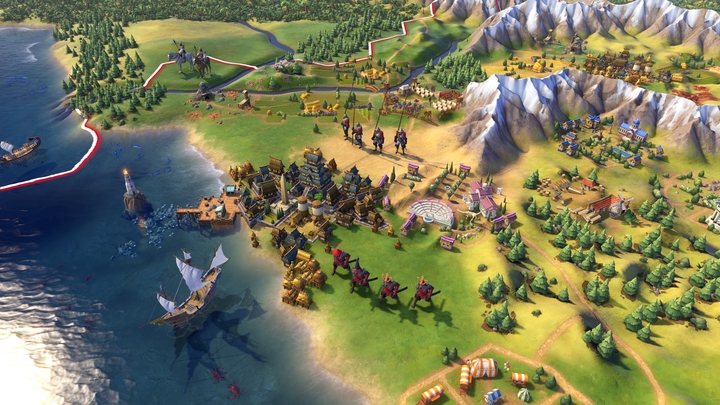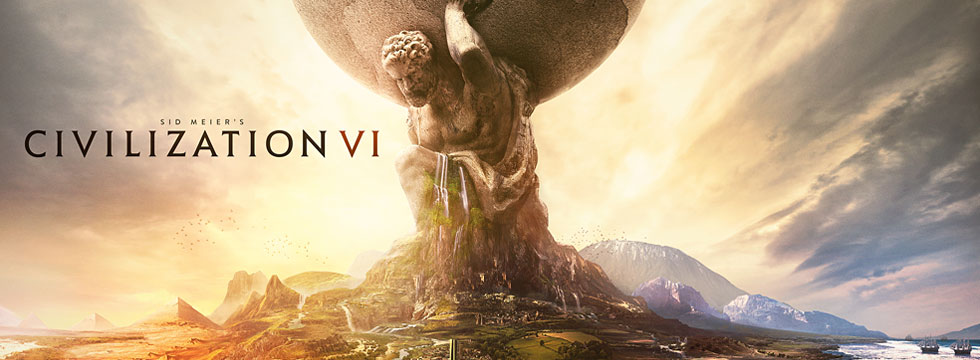Sid Meier’s Civilization VI announced – first look at the emperor of strategy games
The long-awaited new Civilization, the sixth installment in the series, will be released this fall. In order to learn more about the most important innovations in the gameplay, we’ve interviewed the developers from Firaxis.
Read the review Sid Meier’s Civilization VI review – one turn short of perfection
This text was based on the PC version.
- Brand new game code;
- Specialized cities;
- Players taking an active part in development and research;
- Dynamic diplomacy;
- Combining military units into superior formations;
- More possibilities in the multiplayer;
- Modding support.
They say the world was made in six days – the seventh was for rest. In a video game we can actually do a lot better – say, a continent in six minutes? Maybe even six clicks of a mouse? Let’s take the sixth installment in the popular franchise, and we may produce a perfect world – rich with culture, maintaining a balanced diplomacy and run by remarkable inventions. Or maybe quite the contrary – total hell on Earth, ravaged by war for centuries. One thing is certain: there won’t be any time to rest! We will watch over, manage, make decisions and wait. Then wait some more. One more turn... just one more... that’s really the last one... just a minute, let me take that settler there, and I’m done for today... oh, is it 5 a.m. already?
That’s right – we’ve got time for healthy and regular sleep until October 21, and then we have to brace ourselves for many a sleepless night. The sixth part in the 25-year-old series is coming! Sid Meier’s Civilization VI has been in development for a long time, but only after wrapping up the release of the spin-off Beyond Earth and the recent XCOM 2 were Firaxis able to put their minds to the production of their flagship game. We’ve had the utmost pleasure of talking to the studio’s members – lead designer Ed Beach and Senior AI Engineer Andrew Garrett - and learning some important details first-hand! The newest installment is being developed by the same team that brought the extensions Gods & Kings and Brave New World. The latter is where Civilization VI took its spirit from, but obviously there’s more to the newest part than a couple of tweaks and new additions to an old game.
Virtually the entire code has been rewritten, with particular emphasis on the novelties in the mechanics, yet this time around without the simplifications we saw in Civilization V. We can assure the veterans of the series that the solutions introduced in those two expansions – such as religion, archeology, trade routes, and cultural tourism – will also make their way into the newest part. “We loved a lot of those systems that were put into these expansions (...) things like that have been brought forward, because we didn’t want a game that was simplified and devoid of that deep richness”, says Ed Beach, the game’s lead designer. The whole project is overseen by Sid Meier himself – he regularly discusses new ideas and encountered issues with the programmers. So let’s see what awaits us in Civilization VI – apart from the obvious fact that it’s going to devour our time and prompt us to conquer space or at least every neighboring nation, that is.
Cities with a purpose
One of the main new features will be the so-called Expansive Empires – meaning specialized cities, which will be significantly more important than in previous parts. They used to occupy only one hex tile, and had their area of influence. In the new game, agglomerations will be able to occupy adjacent tiles, forming specific districts. Just like in real life, where cities are centered on different purposes (industrial areas full of factories, busy ports associated with thriving commerce, educational centers built around a university, and so on), in Civilization VI we’ll be able to define a specialization for a given place. We can transform adjacent tiles into a scientific campus, where all the big guns of science will do their research and experiments, for instance. We will build industrial, commercial, and even military districts based on the same principle.

Because of that, we will need to be more careful than ever with the selection of the location for establishing cities. “In every Civilization game, you’re always presented with a brand new map and you have to explore it”, says Ed Beach, “[but now] you’re going to try to figure out where are your different cities going to go, and what they’re going to be good at”. Everything is based on logical decisions – commercial cities ought to be raised on river banks or near the sea; having access to areas rich in natural resources is a good opportunity for starting an industry-oriented city. Utilizing those geographical opportunities will provide significant bonuses: establishing a research center near rain forests and mountains – places that are well-suited for the observation of meteorology and the natural environment – will yield a much greater influx of scientists than building the same center in the middle of nowhere.
A peaceful development of the cities will also have an impact on the other side of the coin, namely war. Carpet bombing and frontal attack on the enemy capital? No, thanks. Now, having a clear view of the structure of enemy’s industry, it will perhaps be more effective to weaken their production capabilities by taking over their industrial capital, or hampering their scientific progress by capturing the campus. Same goes for the defense – sometimes, when having an inferior army, we will have to decide which districts can be sacrificed, and which we will have to defend at all cost. On the other hand, a well deployed unit may not be as powerful as to capture the whole city, but may prove resourceful enough to cause so much damage that the enemy will need to split their forces, thus rendering their assault less efficient. “[This system] can change your choice of target, it can also change your approach”, says Andrew Garrett, AI specialist.
Active development and research
It’s one of the biggest novelties in Civilization VI, since the research mechanics have remained virtually unchanged for 25 years. The technology tree was almost identical in all five parts of the series: the player could only chose the direction of the research, and then wait for the scientists to do their thing. How to improve, and more importantly, how to diversify this segment of the gameplay? “What we felt would be a better system, was if the things that you did in the game world – exploring things and pushing your civilization to new directions – would reflect your progress through the technology tree”, said Ed.
How does it work in practice? Each technology has a sort of boost assigned to it, in the form of a mini-quest. Completing it will provide a 50% faster influx of science needed for finishing the given research. Instead of just waiting for the invention of Masonry, you can find stone deposits on the map and start a quarry, and it will get you much closer to the discovery. A nation that has cities and units close to a body of water will make discoveries associated with sea voyage much sooner than an inland nation lacking appropriate boosts. This should transform passive, boring waiting into something interesting, but also something that increases the impression of a coherent and natural development.

Dynamic diplomacy
A peculiar thing about diplomacy in the older games was that it always worked on the same principles, regardless of whether we’ve just established that the Earth is not carried on a turtle’s back, or managed to split the atom. It didn’t seem too realistic, nor in line with history. Now, the diplomacy is going to undergo changes throughout the ages: from first, primitive contacts (War?! We’ll, let’s do war!!!) to sophisticated administration, ambassadors, attachés, etc. In Civilization VI, the diplomacy aims to show the changes that occurred in international relations over time, but that’s not everything. The system is going to be complemented by the so-called agendas, meaning predetermined, specific goals of the policy of a given nation. Each AI leader will have one main agenda and two additional ones that the players will have to discover themselves.
Let’s assume that one of the rulers is obsessed with the World’s Wonders, and would very much like to control all of them; if we decide to compete with them, and will control more Wonders than they do, there’s no way they are going to let it slide. It’s irrelevant how well the diplomacy will be conducted – some tension will always remain. As soon as we leave the competition, however, we can expect their friendship and support. By discovering who serves which agenda, we can easily predict who’s going to be a good ally, and who will become our sworn enemy sooner or later. “By looking at these agendas, you change the way the puzzles work, says Andrew Garett. “It will always be different, because it’s a different selection of people each time. If you’re really clever and you can use the system well, you might be able to arrange it and set two AIs against each other, sit back, and watch them fight”.
The power of combined forces
Reducing the number of units per tile to one had some advantages in Civilization V; it introduced more tactical depth to the combat. We always knew where the artillery, the cavalry, etc. was, hence we were able to strike at the right position. However, it sometimes led to an unbelievably great mess on the map, which became thronged with maneuvering units. In the newest installment, certain military units, labeled as support, will be allowed to share a tile with another unit. Battering rams, siege towers, anti-aircraft and anti-tank units are in fact infantry support formations, so instead of occupying a single tile themselves, they can join another unit in order to make things more convenient in terms of transport and map legibility. Another way to pair units is by providing a soldier as an escort for a settler or a worker – the soldier will then protect the defenseless citizens. Further into the game, the ability to combine a given type of unit into corps, or even armies, will become available, enabling us to control units of different military potential while maintaining the tactical importance of single, specialized formations.

Get some sleep while you can
We’ve discussed the most important parts of gameplay that we were able to learn about in out interview with the devs. It was also revealed that the multiplayer will get some polishing as well – it will receive a range of different scenarios that can be finished during one session. Devs from Firaxis haven’t forgotten about the modders either. While developing the new engine, mod support was taken into consideration from the very beginning, which will surely facilitate the implementation of the mods into the game.
When asked about newcomers to the series, the developers assured us that there’s nothing to worry about; thanks to brand new tutorials, Civilization VI will be very approachable for the new players. It’s supposed to be fairly simple at the beginning and become increasingly complex, while revealing deeper layers of the mechanics, further into the game. “We’re very carefully considering the experience for brand new players, putting a lot of work on keeping the game very simple in the beginning”, explained Ed Beach. “A lot of the elements we’ve talked about are only unlocked as you get deeper into the game”.
More details will be revealed as the release date gets closer. The image of the upcoming game that has emerged after our chat with the developers looks most interesting, and there’s surely more stuff that Firaxis has got brewing for us. Battlefield 1, also slated for the October release, has just became a number two priority for a lot of people, there’s no doubt about that.




